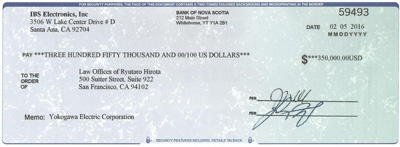Scammers continue to target attorneys with check fraud
By Amy Yarbrough
Staff Writer
Ryutaro “Rudy” Hirota had his suspicions from the get-go. In
early February, someone claiming to be an executive from a multinational
Japanese electronics company contacted his firm saying they needed help
obtaining a visa for an employee to work at a U.S. subsidiary.
 |
| The check appeared legitimate but turned out to be fake |
Although his firm represents U.S. subsidiaries of Japanese
companies, Hirota found the solicitation “kind of strange,” because the company
Yokogawa is huge and should have in-house counsel to handle the matter
themselves. What’s more, the person claimed to be the vice president of
marketing, couldn’t read or write Japanese despite supposedly having an office
in Tokyo and refused to talk over the phone.
Despite quickly cutting off communication, a check for $350,000
soon arrived at Hirota’s San Francisco office – the carrot in a scam that
continues to target the legal community.
Hirota believes that had he deposited the check – ridiculously
large for the services to be rendered and phony – the fraudster would have attempted
to steal money from his client trust account.
“There’s no company on the face of the earth that would
write a check of that size without having a retainer agreement,” he noted.
Scams like the one Hirota encountered have been such a persistent problem, that the
Committee on Professional Responsibility and Conduct (COPRAC) issued a January
2011 ethics
alert. COPRAC recommends avoiding such solicitations altogether. If not, do
your research and hold all funds deposited in your trust account until after
they’ve been cleared.
Hirota suspects that in his firm’s case, the fraudster
planned to write back saying a mistake had been made and ask for a refund of
the overpaid amount.
Upon further investigation, he discovered the routing number
of the check was not right. There was also notice on Yokogawa’s website from
2014 stating that someone had tried to impersonate its officers. He notified
the company and Japanese consulate.
A lawyer for 27 years, Hirota said he had the experience
that helped him avoid being a victim. But he worries about attorneys who are
just out of law school and hungry for work.
“I know there are probably some attorneys out there just
hanging their shingles out and wouldn’t know any better,” he said, who noting
amount of the check exceeded the supposed fees Yokogawa would incur for the visa
by about $343,000.
“It’s quite laughable but it they weren’t aware of these
little things, it might seem quite legit,” he said.